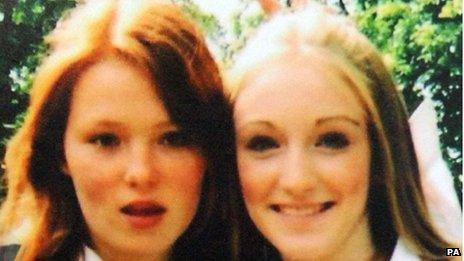Network Rail apologises to families over level crossing deaths
- Published
Network Rail boss Mark Carne offered a "full and frank apology"
Network Rail has offered a "full and unreserved apology" to families bereaved by level crossing accidents.
Chief executive Mark Carne apologised for "failings", external in managing public safety and for "failing to deal sensitively" with affected families.
Risk at level crossings had been reduced by a quarter since 2010, the rail infrastructure company said.
The apology came as an MPs' report strongly criticised Network Rail's (NR) handling of tragedies in the past.
The House of Commons transport committee was particularly critical about the deaths of Olivia Bazlinton, 14, and Charlotte Thompson, 13, at Elsenham crossing, in Essex, in 2005.
NR was later fined £1m for health and safety breaches in relation to the accident.
Mr Carne said that case had represented "a watershed in the way we thought about our approach to the risk at level crossings, and how we treat victims and their families".

Network Rail later admitted safety breaches over the girls' deaths in 2005
Reg Thompson's 13 year old daughter Charlotte was killed at a level crossing
He told the BBC he was "determined to change the culture" of NR, and said £130m had been spent on improving level crossing safety since 2010.
He said: "Today, I wish to extend a full and unreserved apology on behalf of Network Rail to all those whose life has been touched by a failing, however large or small, made by this company in managing public safety at level crossings, and in failing to deal sensitively with the families affected.
"It was too easy in the past for the culture and the company to blame user misuse and not really look closely enough at our role in reducing the risk associated with those level crossings."
'Callous disregard'
Unveiling the transport committee's report, chairwoman Louise Ellman said Network Rail had lowered the risk of death at level crossings by 25% since 2008.
But she also said that on "too many occasions Network Rail showed a callous disregard for the feelings of the families of people killed" or injured at level crossings.
She told the BBC that she was "appalled" to hear "harrowing accounts" from bereaved families, who had been treated with what she termed "contempt" by NR.
Speaking about the description of victims as "trespassers" by NR, she said: "I can only think it was Network Rail not wanting to admit any liability, but it was inhumane, it was wrong and this must change."
And asked what she would say to Reg Thompson, the father of Elsenham victim Charlotte, she added: "Nothing can replace his lost daughter, what happened was very, very terrible, but I hope he can take some comfort in recognising that Network Rail are now formally apologising in a very full way, and that they are going to change."
Friends Charlotte and Olivia died after walking across the tracks through an unlocked wicket gate at the crossing in December 2005. They had already waited for one train to pass, but were struck by a second train bound for Stansted Airport, in Essex.
In February 2011, evidence emerged of a report that had recommended installation of new gates that locked automatically in 2002 - three years before the girls' deaths - but this was not done until the summer of 2007.
Mr Thompson told BBC Radio 4's Today programme: "Network Rail showed the utmost disregard for the families to the point that they never contacted us, showed no concern or compassion at any point.
"They made it very clear they blamed Charlotte and Liv for their demise - up and until they were forced to acknowledge their own guilt more than six years after the accident."
So far in 2013-14 there have been seven "accidental fatalities" at crossings, and a further 12 collisions between road vehicles and trains, according to the Rail Safety and Standards Board.
In 2012-13 nine people - including four pedestrians and five people who were in a vehicle at the time - died in accidents at level crossings.
The safety work carried out at level crossings by NR includes building footbridges to replace crossings, installing power-operated gates and introducing spoken warnings. Almost 800 crossings have been closed in that time.
- Published21 January 2014
- Published31 October 2013
- Published22 October 2013